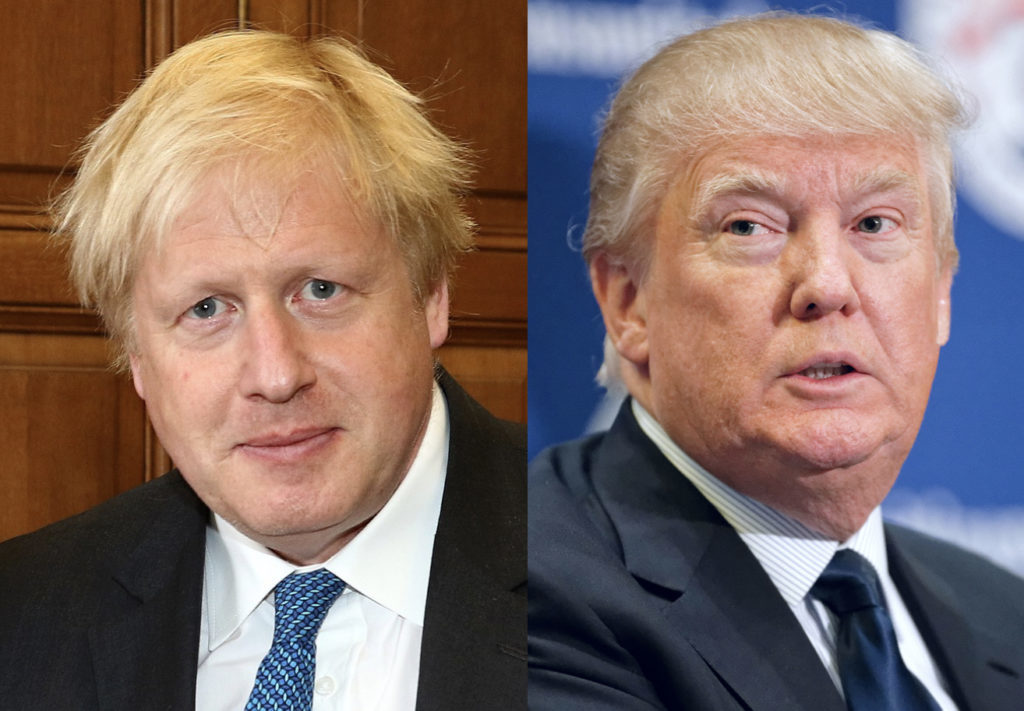Donald Trump’s UK counterpart Boris Johnson is more dangerous than you think

If you want to understand Boris Johnson, the likeliest candidate for the next Prime Minister of Great Britain, it’s helpful to understand Winston Churchill. Not that Johnson is of the same caliber as Churchill. He isn’t. But the life of Boris Johnson is a kind of parody of Churchill’s, consciously so or not.
One can get a special insight into Boris Johnson through his 2014 book, “The Churchill Factor.” It will tell you three things. First, say whatever you like about the man, Boris Johnson is possessed of a first class scholar’s brain. He isn’t the complete clown many believe him to be. Second, he is one of those unrepentant Churchill apologists, and he makes a very good case for being one. Third, whether he is aware of it or not, he, like Churchill, is in a very good position to prove that he is good at one political job and one political job only, that of Prime Minister, because he’s thoroughly rubbish at every other political job he’s ever had.
The difference, of course, is Churchill actually pulled it off. It remains to be seen if Johnson will, and I sincerely hope he never gets the chance. For one thing, I’m beginning to suspect – only suspect, mind you – that every goof Boris has ever made in public life he’s made intentionally. Either that or those goofs were of the unconscious kind that tend to make Sigmund Freud grin.
Just as Churchill had his Dardanelles, his embarrassing views on race and Gandhi, his thick-headed persistent championing of Edward VIII, Boris has had his share of gaffs and boneheadisms. Is his entire life therefore a makeover, in emulation of Churchill? Given the esteem in which Boris holds Churchill, it’s more than a rhetorical question. One cannot help but wonder if, in the back of his mind, he doesn’t see himself as a sort of incorrigible Prince Hal about to be transformed into the noble Henry V at Agincourt, the final result made all the more remarkable by the contrast of the clown he used to be and the statesman he’s prepared to become. Whatever the case, one cannot doubt that Boris wishes to be Prime Minister.
Now here’s the problem with that. It isn’t only owing to his unruly blonde hair that makes people think of Donald Trump when they see Boris Johnson, it’s that he and Trump seem part of the same piece of the alarming rise of neo-conservative fascism worldwide. Boris refused to castigate Trump for Trump’s obscene insult of Britain’s ambassador to the United States, Sir Kim Darroch, and, perhaps already knowing that it will be Boris Johnson and not Johnson’s rival for the premiership, Jeremy Hunt, who will lead the nation, Sir Kim has accordingly resigned.
Moreover, Boris isn’t just in favor of Brexit, he’s in favor of a no-deal Brexit that will leave Britain without the porous borders so advantageous to trade and freedom of movement. Like Trump, Boris is something of an isolationist, and while that’s a long way from fascism it definitely plays into the kind of paranoia in which fascism tends to blossom.
Perhaps even more than the war years, it was Churchill’s “wilderness years,” just before the war, when Winston was out of power and out of political capital, and still he stood virtually alone to rail against the threat of Hitler and the growing menace of Nazi Germany. It was then that Churchill truly established his bona fides as a possessor of an unimpeachable moral compass. Those close to Boris know him to have, like Trump, an arm’s length relationship with the truth and a somewhat shady approach to politics. It is difficult to imagine Boris taking an unpopular, Churchillian, come-what-may moral stance on anything that he cannot calculate in advance to five decimal places, his scholar’s appreciation of Churchill as an example to emulate or not.

Robert Harrington is an American expat living in Britain. He is a portrait painter.
